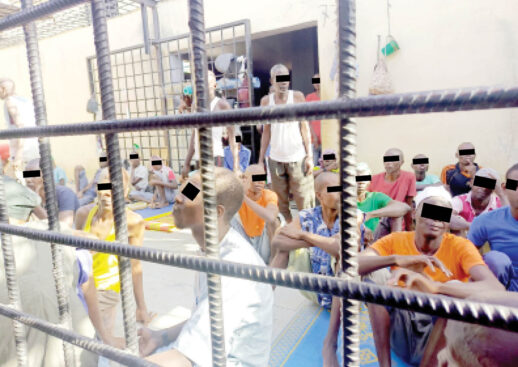Over 2,000 people under investigation over suspicion of Boko Haram activities have been waiting for justice at Giwa Barracks, Maiduguri, the Borno State capital, Daily Trust on Sunday reports. They include suspected Boko Haram fighters, their wives, parents, children and others.
It was learnt that their cases have dragged for years due to a variety of reasons.
According to military record, 2,048 people were held in that facility as at March 2023. This number included 35 women, 10 female children, seven male children, while the remaining 1,991 were adult males.
Our correspondent who visited the facility saw how these detainees were crammed into four iron rod cages/cells under a soaring Maiduguri temperature that hovers between 38 and 43 degrees Celsius.
A former Theatre Commander, Operation Lafiya Dole, Major-General Rogers Nicholas, explained to Daily Trust on Sunday that the 200- capacity detention centre, which was constructed by the 47 Engineering Brigade of the Nigerian Army, was inaugurated in 2013.
The facility is meant to serve as a temporary detention centre to investigate people arrested at warfronts and profile them, either for prosecution or reintegration.
However, most of the inmates interviewed by our correspondent claimed they had stayed at the detention centre for up to 10 years without being charged to court, while many of them said they had spent more than a year.
Majority of them also claimed that they had lived in that crowded condition without being formally told of their crimes so that they would defend themselves, when they would be prosecuted or when their detention would end.
On its part, the military sees the facility as an essential part of their operation to end Boko Haram insurgency in the North East.
A captain in charge of the facility said it’s a temporary detention centre, adding, “It is of world standard and not bad as people imagine. We don’t condone maltreatment of inmates by soldiers.”
He said no inmate would be kept in the facility for too long without having a case to answer.
We don’t know our offences – Suspects
Some of the detainees told our correspondent that apart from the fact that they did not know why they were being detained, they had lost their connections to the world, saying it is the worst tragedy that could befall anyone.
They claimed they had not gotten in touch nor seen their parents and children for as long as they had stayed in the facility.
Asked if they were given access to lawyers to enable them challenge their detention, they said, “Such opportunity has not been given to us. Once you are here you don’t have any right,” one of the inmates said.
One of the soldiers guarding the cell said, “It is a pity that some of them are being used as prey to get to their loved ones.”
He narrated how an aged mother of a stubborn Boko Haram commander was held for four years in the facility and was used as a bait to get to her son.
During interrogation, the woman said her son told her that he was doing the work of God, but over the years, she was made to understand that what her son was doing was wrong and she became remorseful.
“She regretted that her son was a combatant. The military was able to connect her with the son through a repentant Boko Haram fighter. They spoke and the mother convinced him to repent and surrender to the military. I think she would soon be released.
“This is in line with retired General Ishaka’s initiative. Initially, the son claimed that his mother was killed by the military, therefore, he would continue with terrorism, but fortunately, the mother was alive and they were connected on phone.
“Now, the son has promised to lay down arms, turn himself in and the weapons in his possession to be surrendered to the military, given the condition that his mother would be set free,” the soldier said.
A detainee, Malam Muhammad Jega, who was arrested by the military at the Chadian border to Nigeria in Bakassi, said most of the detainees in the facility did not sleep at night, thinking about the families they left behind and the future that lies ahead.
“I am a smoked fish dealer in Bakassi. I was into this business even before former President Obasanjo ceded Bakassi town to Cameroon. In 2020, I was on a business trip when the military intercepted me, saying they were suspecting the goods I was carrying. That’s how I was brought here.
“This is my third year in this place without being told my actual offence. Our wives have remarried because they gave up on us. Our children are left in the streets to beg for food. We also lost our businesses. In fact, we have lost everything. And we don’t know when we would be set free to reunite with our families. We are in a very difficult situation.
“I am appealing to military authorities and the federal government to look into our plight and set us free,” he said.
At the female section of the facility, a television set displayed a counterterrorism film on a DSTV channel as the detainees sat on rubber mats.
Malama Nana said she was arrested on her way to market and forced to leave four children, an aged mother and husband behind at home.
“I was intercepted by a convoy of military vans on my way to market. They took me to this place without telling me the crime I committed. I was in my first trimester of my pregnancy when they brought me in.
“I delivered the baby and he is now 9 months old, but as I am talking to you, none of my family members knows where I am. Living in this facility is sickening. I still don’t know what they are accusing me of,” she said.
In the facility, our correspondent saw soldiers teaching children under the ages of 10 under a tree in the facility.
The teachers said some of the children were born in the facility, adding, “They are very intelligent.”
Asked if the children were also forcefully taken to the facility, one of the mothers said, “None of them was taken by force. The children you see were born here. The allegation that pregnancies are being aborted or children killed here is a dirty lie.
“We have stayed in this facility for too long and it is affecting us psychologically. Help us beg them to release and reunite us with our families at home.”
Another woman who gave her name as Falmata said they did not face any form of maltreatment throughout their confinement, but their freedom has been taken away from them.
In a Kanuri accent she said, “Our brains are rusting here. We have television to watch and food to eat, but that is not enough. What I need is for the military to set us free so that everyone can return home.”
Our correspondent also observed a small cell where some minors were detained. One of the soldiers said they did not have the right to keep them for too long, adding that they were waiting for the state government to pick them up.
“They are underage, so they don’t have any case to answer. It is the state government that is delaying them; we have gotten approval from the Borno State Government to release them to the Ministry of Women Affairs and Youth Development.
“The ministry said they were coming to pick them, but they have not come. They are still looking for their families, and they don’t have a space to keep them there,” he said.
In his response, the permanent secretary in the Ministry of Women Affairs said they took 80 detainees from the facility last month, but the influx of insurgents surrendering was massive.
“At Bulunkutu alone, we kept over 2,000; we have other two facilities where we keep them. Our facilities are overstretched, that’s why we record some delays. I believe that the government is living up to its responsibility,” he said.
He said the burden on the state government was huge considering the cost of feeding, training and reuniting inmates with their families.
Culled from DailyTrust







